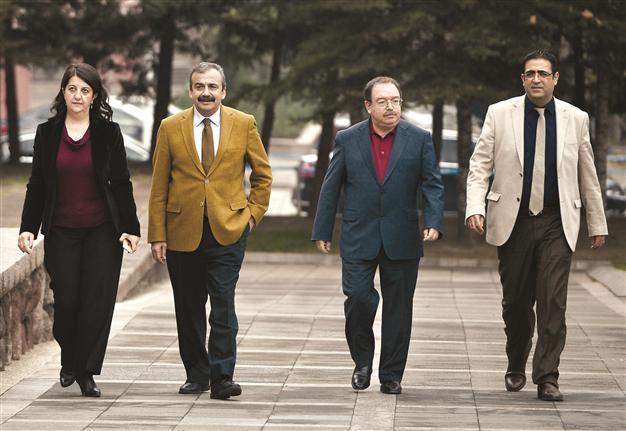HDP reveals PKK leader’s draft envisions autonomy
ANKARA

HDP Istanbul deputy Sırrı Süreyya Önder (2nd L) says the ‘autonomy’ issue was a part of the ‘draft negotiation framework’ within the Kurdish peace bid. AA Photo
The recognition of “autonomy” is part of a “draft negotiation framework” drawn up by the jailed leader of the outlawed Kurdistan Workers’ Party (PKK) in an effort to foster a substantial reconciliation process, according to a leading deputy of the Peoples’ Democratic Party (HDP).
All matters surrounding fundamental rights have been covered in the “Democratic Solution and Negotiation Draft,” HDP Istanbul deputy Sırrı Süreyya Önder told reporters Dec. 10 when asked to elaborate on the draft’s role alongside “democratic negotiations.”
The content will be made public under the title “democratization,” Önder said.
Both jailed PKK leader Abdullah Öcalan and the HDP consider the process so far as a “dialogue” phase, and have urged the government to accelerate the process for a “transition into negotiations.”
The frame put by Öcalan and, most probably, already shared with the government is assumed to have outlined the formation of negotiation conditions and implementing negotiation mechanisms.
The frame includes all required legal and constitutional amendments and also outlines “autonomy,” Önder said, without elaborating.
The frame was handed over by Öcalan to a visiting delegation including Önder on Nov. 29. In addition to Önder, the deputy parliamentary group chairs of the HDP, İdris Baluken and Pervin Buldan, and veteran politician Hatip Dicle, were part of the delegation that visited Öcalan after a long hiatus since the last visit, which took place on Oct. 22.
The same delegation conducted a lengthy meeting with Deputy Prime Minister Yalçın Akdoğan as recently as Dec. 8. During the meeting with Akdoğan, thought to have been the longest public meeting between the HDP and the government so far in the ongoing peace process, the HDP delegation was assumed to have officially shared Öcalan’s framework with the government.
After its meetings with Öcalan and Akdoğan, the HDP delegation, apart from Önder, headed to the Kandil Mountains along the Iranian border of Iraq in order to meet executives of the Kurdish Communities Union (KCK), the urban wing of the PKK, on Dec. 9.
“KCK executives stated that they ‘Democratic Solution and Negotiation Draft’ has been accepted exactly with a full agreement and that, as the organization, they are ready to fulfill all of their duties and responsibilities for moving ahead to the final solution in line with this draft,” the HDP delegation said in a written statement released Dec. 10.
“They emphasized that they regard this draft as a manifesto that should be implemented at once, not only for the solution of the Kurdish issue, but also for democratic future of Turkey and the Middle East. They stated that they want this draft, which is accepted by them, also to be accepted by the state of Turkey and the AKP [the ruling Justice and Development Party] government and that the responses of the state and government officials that are not yet clear should be clarified at once and declared to our peoples and the public,” the HDP delegation said.
Along with the recognition of Kurdish identity in the Constitution and the recognition of the right to mother-tongue education, the recognition of “democratic” autonomy is one of the key three demands that the KCK has long been asking for in order to be able to advance the peace process. As well as the other two demands, however, the democratic autonomy demand touches many raw nerves in the country.
PKK militants took up arms in 1984 to fight for Kurdish independence but later revised that goal to autonomy in southeastern Turkey.
Öcalan, serving a life sentence on İmralı Island in the Sea of Marmara, has been in dialogue with state officials, the HDP and its predecessor, the Peace and Democracy Party (BDP), since at least late 2012, and is playing a central role in the process.
However, the talks have stalled since street violence in early October that claimed dozens of lives in country-wide protests against the government’s perceived inaction over the Islamic Republic of Iraq and the Levant’s (ISIL) assault on the Kurdish-populated town of Kobane in northern Syria, near the border with Turkey.
